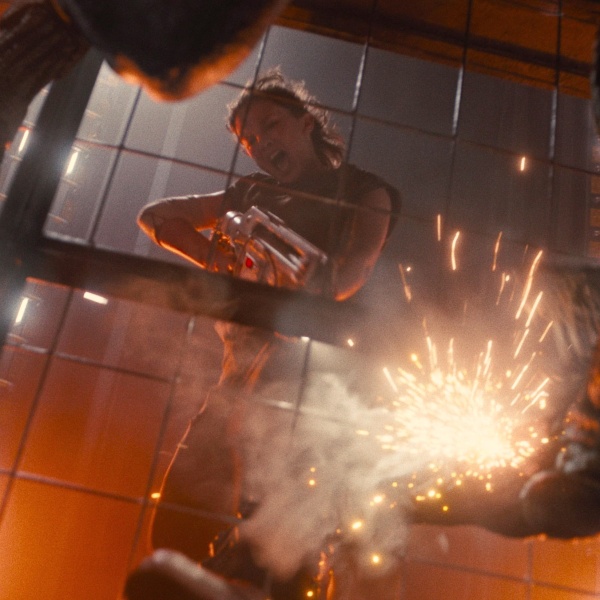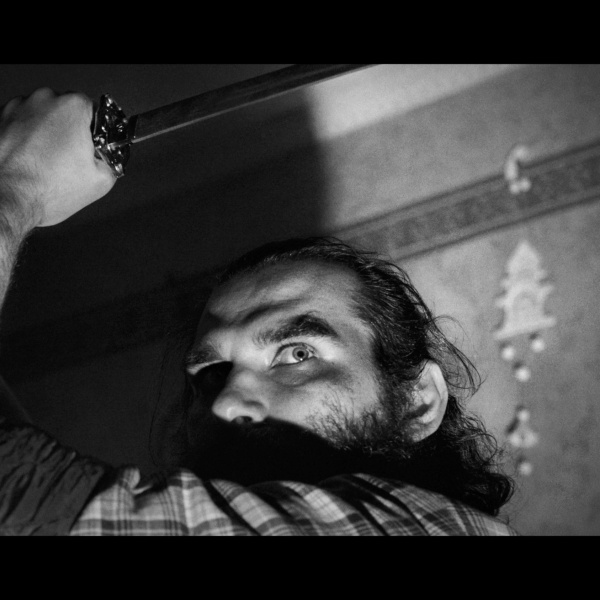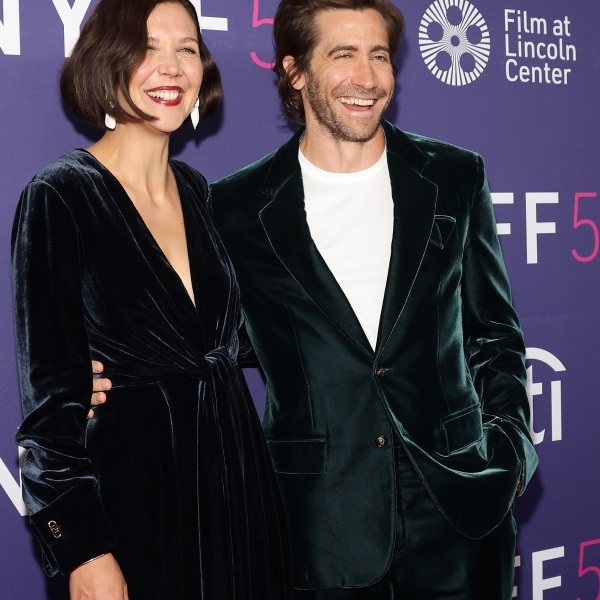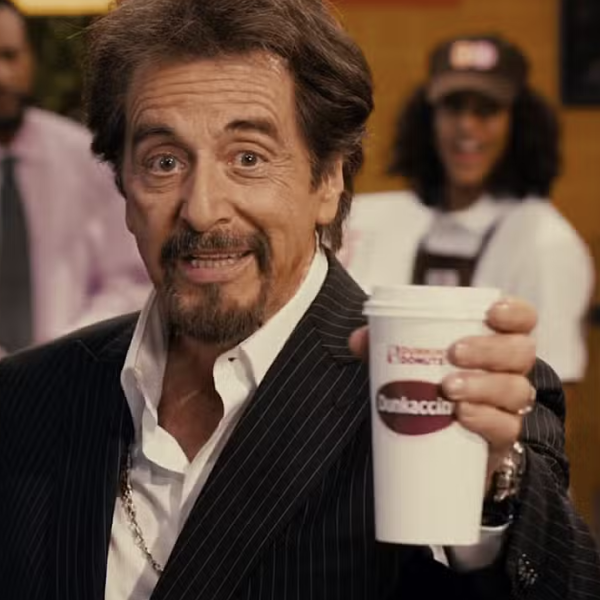
Note: Our U.K. writer saw the film early and this review was first published on April 26, 2011
The biggest change in the comic book movie in the last twenty-odd years since Tim Burton made it a lucrative cinematic genre with “Batman” is that they’ve become less and less like comic books. The likes of “Steel,” “The Phantom” and “Batman and Robin” may have been both unsuccessful, and nearly unwatchable, but they were at least rooted in their pulp origins, immediately recognizable as being derived from the comics world.
These days, aside from slavish, frame by frame imitations like “Sin City” or “300,” or self-conscious stylistic experiments like Ang Lee‘s “Hulk,” the genre has found its greatest success in movie theaters by embracing reality. “Spiderman II” might be about a man with the powers of an insect, fighting a guy with robot tentacles on its back, but it’s grounded in a recognizable world, with a hero with relatable problems. Bryan Singer struck gold with “X-Men” by playing up its parallels to civil rights and teen sexuality, while the most successful of the lot, Christopher Nolan‘s “Batman Begins” and “The Dark Knight,” are essentially crime dramas that happen to involve a hero who dresses up as a bat. Keeping it real is clearly the way to go.

Which is what makes this summer so interesting. June brings “Green Lantern,” Warner Bros‘ CGI-heavy space-hopping adventure that seems to be positively psychedelic in its imagery, but first up is “Thor,” easily the biggest risk yet taken since the comics giants started backing their own big-screen adaptations. Whereas “Iron Man” revolved around a charming billionaire in a robot suit, and “The Incredible Hulk” starred a household name of a character, one with an immediately relatable premise (he gets angry, he turns into a monster), “Thor” takes as its main character the Norse god of thunder. A Norse god of thunder who, in this take, is also kind of an alien, living in one of the “nine realms” of Asgard — a Utopian planet full of other gods. Oh, and at the same time, the film has to work the character into the existing Marvel movie universe, so that he can return next summer in “The Avengers.” With an unknown, Australian actor Chris Hemsworth, in the lead, a director, Kenneth Branagh, with no tentpole experience and best known for his (mostly not particularly good) Shakespeare adaptations, and a series of trailers that raised eyebrows among most, had Marvel finally become unstuck?
Thor (Hemsworth) is the brash eldest son of Odin (Anthony Hopkins), who has ruled over Asgard, and protected the other eight realms of the universe, for millenia. On the day that Thor is about to be crowned as his father’s successor, a group of Frost Giants, ancient enemies of Asgard, invade the palace, in search of an old relic. They’re quickly dispatched, but hot-headed Thor, encouraged by his beloved brother Loki (Tom Hiddleston), seeks vengeance, against his father’s wishes. The act leads to Thor being stripped of his powers and his hammer Mjolnir, and banished to Earth, where he lands in New Mexico, virtually straight into the arms of fetching astrophysicist Jane Foster (Natalie Portman). While he tries to find his way home, Loki is discovering his surprising true nature…
The first half-hour or so of “Thor” is a little awkward. Understandably, Branagh & Marvel are reluctant to keep away from Earth, and the film’s biggest name, Portman, for too long, so things start off with a brief introduction to her character, along with those of Stellan Skasgard and Kat Dennings, as they stumble across a newly-arrived-on-Earth Thor. But in one of the more abrupt, jarring edits in recent memory, we’re suddenly in a “Lord of the Rings“-style prologue, complete with CGI armies and an exposition-heavy voiceover. And then we’re meeting Thor and Loki as kids. And then, finally, we get into the meat and veg of the story.
The film’s biggest issue is with the structure — that first act nakedly feels like moving the pieces around the board so that the story can really get going, so it’s not hugely involving as a result. Jumping between Asgard and Earth for the rest of the film is sometimes unsatisfying as well: it feels like another pass, perhaps with a different editor (Paul Rubell, of both “Transformers” films and several recent Michael Mann pictures, is responsible), it might have led to a more satisfying end product. 
But what’s surprising is that, taken individually, both the section set in New Mexico, and the more cosmic scenes (which seem to account for the majority of the film) work, and in different ways. We still have some issues with the design for Asgard and its inhabitants — the shiny, shiny costumes and coronation hall in our introduction to the world of the gods mostly comes off as gaudy, and it’s all a little overwhelming at first. But you settle into the world eventually, and much of it comes across as genuinely distinctive, and certainly sets the film apart from most of its comic book contemporaries. Even if the effects let things down in one or two places, when it works (the gate that transports Thor & co to different worlds is a thing of Silver Age beauty), it’s generally speaking the most successful attempt at a far out, Jack Kirby-style world and, admirably, never quite tips over the edge into camp.
It’s a firmly comic-book style, and it carries over to the Earthbound segments. Branagh’s use of dutch angles might verge on self-parody in places (The Playlist team is currently saving up to buy DP Haris Zambarloukos, whose work here is mostly good, a tripod with three legs of the same size), but like the lens flares in J.J. Abrams‘ “Star Trek,” they give the film an immediate, larger-than-life feel, and one again indebted to the classic Marvel comics that Branagh grew up on. The director certainly has a feel for iconic framing, and perhaps more successfully than any other comic book movie (there are no Ang Lee-style panel transitions, for instance), it nods to the source material without becoming slavish. The content’s pretty good too — almost a different film, a lighter, frothier fish-out-of-water comedy, but it comes as something as a tonic to the more angst-y Asgardian elements.
What really makes the film work, and ties the two threads together, is that the central cast commits 100% to their roles. Hemsworth is a real casting coup, displaying the same dignity and nobility as he showed in his brief role in “Star Trek,” but adding a whole series of new strings to his bow. The comedy stuff in New Mexico works because he makes it work, striding into a pet shop and demanding a horse with the spoiled privilege that comes from being the son of a God. Indeed, that’s rather the key to the character: Thor might be thousands of years old, but he’s still very much a man-child as the film begins. His emotional arc is essentially a coming-of-age one, and Hemsworth is equally convincing as the arrogant, restless boy of the opening, and the fully-fledged hero he becomes by the end. There’s a scene at the midpoint where Thor, crushed at his banishment, is visited while in S.H.I.E.L.D custody by his brother, and the Australian actor is genuinely affecting — he’s the beating heart of the film.
Hiddleston is just as good. Loki’s easily the best villain the Marvel movie universe has come up with to date (it’s no surprise that he’ll be returning to wreak more havoc in “The Avengers”), and a surprisingly complex figure here, and the British actor takes that complexity between the teeth, making the trickster God’s motivations wonderfully oblique and ever-shifting. Hopkins is great too — there’s always a risk that the veteran actor will end up chewing the scenery, but he walks the right line here — while Idris Elba is particularly impressive, and slyly funny, as the all-knowing gatekeeper Helmdall, demonstrating once again (as if proof were needed) that racist comic book fans can go straight to hell.
Unfortunately, while the rest of the cast are strong, most get short shrift; like in most contemporary blockbusters Portman’s fine, but the role is underwritten, and the romance generally undercooked — hardly material for an Oscar winner. Skarsgard and Dennings also get little screen time, particularly the latter, but they’re doing good work. As for the rest of the cast, they mostly feel unnecessary. The Warriors Three (Ray Stevenson, Joshua Dallas and Tadanobu Asano) are the closest the film gets to camp and, while they just about work — particularly Dallas, who’s perfectly foppish — they’re not that funny, and simultaneously underused and extraneous, while Sif (Jaimie Alexander) doesn’t fare much better, although Alexander’s quite sweet in the role. If anyone can explain how Rene Russo was tempted from retirement for about four lines, they should let us know, and the less said about Jeremy Renner‘s brief cameo, another piece of set-up for “The Avengers” (which is mostly less egregious than in the “Iron Man” sequel), the better — it’s evidently been shoehorned in during post-production, and serves no purpose other than to bring the film to a grinding halt, and for a “guess the accent” game (Boston Irish? Southern? Russian? Beats us). But hey, at least Renner’s knocked one film off his mammoth period of servitude to Marvel.
Still, we were all expecting Branagh to do good work with with the actors — how does he handle the tentpole side of things? Surprisingly well. Other than a rushed, repetitive final set piece (something it firmly has in common with “Iron Man 2”) the action is pretty good: coherent and well cut and, in some moments, genuinely super — when he’s powered up, Thor is, of course, a god, and rolls like one. If Zack Snyder is looking for tips on how to handle the action in “The Man Of Steel,” he could do worse than to take some pointers from Branagh. More importantly, there’s a lightness of touch on display that’s really endearing. Like the first “Iron Man” and “Star Trek” (although it’s worth saying that “Thor” isn’t as good as either), the film is flawed, and occasionally silly and clunky, but it’s also relentlessly likable, and consistently entertaining. 
So, for the most part, a pleasant surprise, considering it had looked for some time like a major misfire. It won’t take its place in the superhero hall of fame alongside “X-Men 2” and “Spider-Man II,” but it’s also leagues above the 1990s camp fests that nearly killed the genre, and it’s certainly on the better end of the Marvel scale to date (for the record from best-to-not-the-best: “Iron Man,” “Thor,” “The Incredible Hulk,” “Iron Man 2”). Whether audiences will show up remains to be seen, but word of mouth is likely to be good, and it’s hard not to walk out without a part of you looking forward to Thor crossing paths with his counterparts next summer. Fingers crossed for “Captain America,” then… [B-]
Note: We saw, by choice, the 2D version of the film, so can’t speak for the quality of the 3D conversion. The word isn’t great, although a few critics have defended it. “Thor” opens in the U.K. this weekend on April 27th and in the U.S. next week on May 6th.





